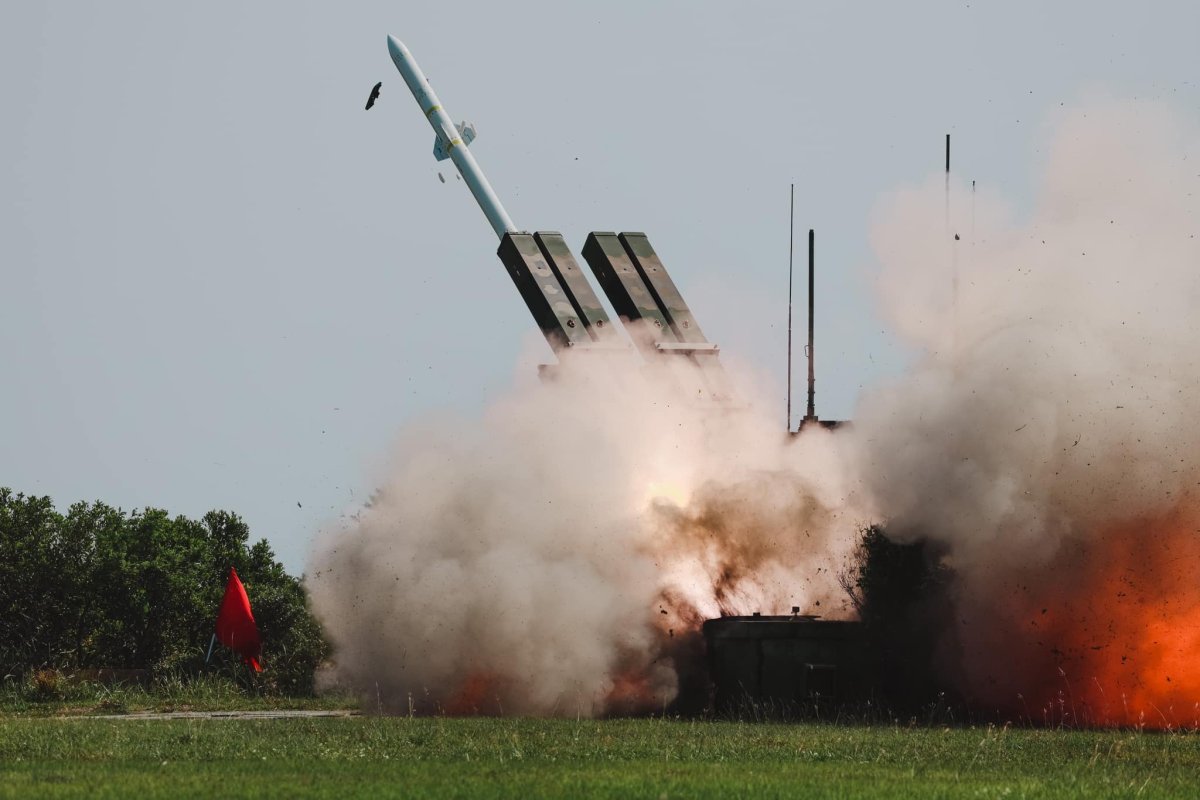Taiwan conducted a live-fire test of its Land Sword II air defense system this week for the first time. Newsweek spoke with an expert about what that means for the country as a possibility of a Chinese invasion lurks in the near future.
The weapons system, developed by state-owned National Chung-Shan Institute of Science and Technology (NSCIST), is part of Taipei's efforts to harness its domestic weapons-making potential to defend against potential attacks from China, which claims the self-ruled island as its territory.
The Land Sword II is a ground-based, short-to-medium range variant of the Sky Sword II series, which already includes air-to-air and ship-launched missiles. It was handed over to the army last year and will replace Taiwan's aging U.S.-made Chaparral air defense system.
The platform has an effective range of up to 15 kilometers (9.3 miles). Its operators can carry out 360-degree surveillance, enabling it to detect fixed or rotary-wing aircraft, unmanned vehicles, and cruise missiles, according to the Liberty Times newspaper, citing the defense ministry.
Monday's test was carried out by the Taiwan Army's 43rd and 21st Artillery Commands at Jiupeng Military Base in the southernmost county of Pingtung, according to the island's defense ministry's news portal.
Military enthusiasts and other onlookers gathered outside the base to observe the test firings, which began just after 9 a.m., local media reported.
The artillery crews fired three Land Sword Missiles in total, successfully hitting their target drones each time.
Troops also live-fired Stinger missiles from the Dual Mount Stinger and Humvee-mounted Avenger surface-to-air missile systems.
Taiwan's Ministry of National Defense did not immediately respond to a written request for comment.
The Land Sword II complements already deployed platforms such as the longer-range Sky Bow 3 surface-to-air missile system, also domestically developed.
The self-ruled island is also slowly churning out new warships and continuing arms purchases from its main supplier, the United States, which is required to provide defensive weapons under the 1979 Taiwan Relations Act.
Raymond Kuo, a political scientist at the RAND Corp. think tank, stressed the merits of the weaponry like the Sky Sword family of missiles, pointing out Israel's air defense missiles were critical to blunting the missile and drone barrages launched by Iran and its proxy forces Sunday.
The weapons could also help negate the overwhelming numerical advantage China has in terms of warplanes and ground-based missiles.

"Preventing air superiority is essential to ensuring the Taiwanese ground forces can advance to their muster points and defend against, say, Chinese invasion. If sufficiently large and effective, Taiwan can create an "air defense bubble" that could defend other forces coming to its aid," Kuo told Newsweek.
The fact that Taiwan is producing such missiles itself also gives American arms producers some breathing room as Washington seeks to address shortages amid ongoing conflicts in Ukraine and the Middle East.
"We've let our defense industrial base atrophy, and with the re-emergence of major power war, we're playing catch up... The more Taiwan can produce the systems it needs on its own, the more that frees up the U.S. to manufacture the equipment that Taiwan cannot produce by itself," he said.
President Xi Jinping has said unification is inevitable and directed China's military to make itself invasion-ready by 2027.
China's People's Liberation Army has significantly increased its activities around Taiwan in recent years, including near-daily sorties over the de facto median line in the 90-mile-wide Taiwan Strait that separates the neighbors.
Taiwan's defense ministry reported 12 of the 18 Chinese military aircraft operating over the strait had crossed over that line Thursday morning.
Uncommon Knowledge
Newsweek is committed to challenging conventional wisdom and finding connections in the search for common ground.
Newsweek is committed to challenging conventional wisdom and finding connections in the search for common ground.
About the writer
Micah McCartney is a reporter for Newsweek based in Taipei, Taiwan. He covers U.S.-China relations, East Asian and Southeast Asian ... Read more
To read how Newsweek uses AI as a newsroom tool, Click here.








